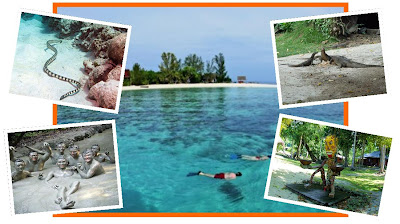GUIDE TO SABAH PARKS
Located at the northern tip of Borneo, Sabah is abundant with eco-treasure from mountain high to ocean deep. Visitors can enjoy the natural wonders found in various state parks and national reserves that are gazetted under Sabah Parks
Located at the northern tip of Borneo, Sabah is abundant with eco-treasure from mountain high to ocean deep. Visitors can enjoy the natural wonders found in various state parks and national reserves that are gazetted under Sabah Parks
Kinabalu Park is the first “World Heritage Site” in Malaysia which was designated by UNESCO in December 2000. It is located at 1,585m above sea level and expands larger than Singapore at 754sq.km. The Park is reputed to have the richest and most remarkable assemblage of plants that is unique to no place else between the Himalayas and New Guinea. This Centre of Plant Diversity for Southeast Asia has a remarkable collection of flora which includes more than half the species of all flowering plants. More than 5,000 vascular plant species, an estimated 1,000 orchid species, 621 fern species, nine Nepenthes species, 29 Rhododendron species and two Rafflesia species can be found within the vicinity. Other local residents include 90 lowland mammal species, 11 montane mammal species, 21 bat species, 326 bird species, 62 toad and frog species and a large population of the 850 butterfly species that occurs in Sabah. Visitors can explore the natural wonders of the surrounding area while enjoying the breathtaking scenery of Mount Kinabalu which stands proudly at 4095.2m tall. Besides mountain climbing, there are nine other nature trails that are popular with naturalists and bird watchers alike. Another attraction that is not-to-be missed is the Mountain Garden, a two-hectare botanical garden that contains display houses which showcase rare orchids, plus a variety of fruiting and flowering plants.
TUNKU ABDUL RAHMAN PARK
Gazetted in 1974, the Tunku Abdul Rahman Park was named after the first Prime Minister of Malaysia. The Park covers an area of 50sq.km and comprises of five islands namely Manukan, Mamutik, Gaya, Sapi and Sulug. Visitors wanting to soak up the sun can depart on a 20-minute speedboat ride from Jesselton Point located in Kota Kinabalu. Adventurous water babies can jump on a banana boat, parasail, snorkel or scuba dive while nature lovers can jungle trek and wildlife spot. Guests can also opt to seawalk on the Ocean floor surrounding Sapi Island for a chance to mingle with the colourful aquatic residents. This leisure sport is safe for everyone aged eight and above. Facilities such as changing rooms, toilets and picnic shelters are available on all islands. But visitors wanting to stay overnight can either choose to stay in modest chalets on Manukan Island, a minimalist rest house on Mamutik Island or the luxurious Gayana Eco-Resort or Bunga Raya Resort and Spa which are located on Gaya Island. Boat services to the Park operate from 8.30am to 4.00pm.
Plan on activities here? See:
PULAU TIGA PARK
The Pulau Tiga Park situated opposite the Klias Peninsula was gazetted in 1978. Covering a 158.64sq.km area, the Park originally comprised of three islands, namely Pulau Tiga, Kalampunian Damit and Pulau Kalampunian Besar, which is now merely an eroded sandbar. The Park was named after the largest island, Pulau Tiga, which has three undulating humps. Also known as Survivor Island (after being featured in the hit reality TV series, Survivor), the formation came to existence over 100 years ago after the eruption of several mud volcanoes. Visitors can bathe in mud, scuba dive, snorkel or trek along the Larai-larai and Pagong-pagong trails for a chance to spot wildlife such as the long-tailed macaque, monitor lizard, golden skink and flying fox. Birdwatchers will enjoy the large feathered population including the pied-hornbill, megapode, magpie-robin and sunbird. However, the showstoppers are the yellow-lipped sea kraits that inhabit Kalampunian Damit. These sea snakes that come ashore in their hundreds to mate are mostly found curled in rocky grottoes under fallen logs or tree holes. Guests are advised to be extra cautious as these slithering reptiles are extremely poisonous.
CROCKER RANGE PARK
Located 13km from Keningau town in the west cost of Sabah, this largest state terrestrial Park covers an area of 1399.19sq.km. The Park lies within eight districts with an elevation between 100m to 2,050m at the peak of Mount Alab. The Crocker Range was designated as a forest reserve in 1968 for the purpose of conserving the surrounding hill dipterocarp forest and water catchments which provided drinking supply to residents of the west coast and interior of Sabah. The upgraded facilities completed in 2004 are suitable for hosting meetings, camping trips, jungle trekking excursions and educational outdoor activities. Visitors can also explore the Rafflesia sites during the blooming season to spot the largest flower in the world.
This genus of parasitic flowering plants can weigh up to 10kg and span up to 97cm in diameter. Business hours are from 8:00am to 5:00pm daily and entrance fee apply.







